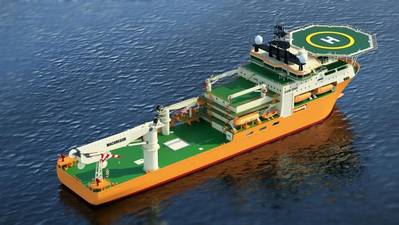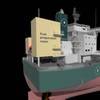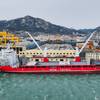Shanghai Zhenhua Heavy Industries Co. Ltd (ZPMC) has commissioned Siemens to equip the latest diving support vessel being built for Toisa Ltd. with complete drive and power systems.
According to Siemens, the solution is designed to improve the vessel’s reliability and maneuverability, as well as reduce fuel consumption, so lowering overall operating costs. The integrated drive system (IDS) used in the vessel, with a length of approximately 146 meters, conforms with the international certification standards of DNV GL. The IDS comprises six Simotics motors and six BlueDrive frequency converters with an output of up to three megawatts each designed specifically to cope with hostile application conditions in terms of temperature, vibration and also moisture. Two of the six converters feature an integrated dual in-feed function which ensures full mobility for the vessel in most exceptional circumstances by means of constant and redundant in-feed power from two independent switch panels.
The multipurpose Saturated diving support/offshore construction vessel (DSV/OCV) will be used for offshore applications primarily in the oil and gas industry and for deep sea projects. Toisa’s vessel will be managed by Sealion Shipping Ltd., a global shipping and support services company located in Farnham, U.K.
To ensure it meets market demands, the diving support vessel will be built in line with the new dual notation standard DYNPOS AUTRO (DP3) and DYNPOS ER (enhanced reliability) issued by DNV GL. This dual notation standard offers ship owners greater flexibility and reliability, and enables implementation of more fuel efficient application configurations such as improved operation of rotating machines like diesel generators. The DYNPOS ER standard represents a major leap forward in terms of development in comparison to the long-established IMO Equipment Class 3 DP, such as DYNPOS AUTRO notations.
All the systems and components used are part of the Siemens “Siship” solution platform. The Integrated Drive System (IDS) used as part of the Siship Drive LV solution comprises the BlueDrive frequency converters and connected Simotics motors. The characteristic feature of the IDS is the optimum interaction between components, which not only speeds up response times, but also improves the drive system’s flexibility, precision and energy efficiency. The six drive trains are divided across three azimuth thrusters, two tunnel thrusters and one extendable thruster.
Two of the six BlueDrive converters are fitted with dual in-feed function, enabling in-feed from two independently operating switch panels simultaneously. The dual in-feed functionality ensures that a power failure in main power supplies is detected within just milliseconds; the affected side of the dual in-feed is separated without the need for any thruster change-over processes, avoiding a wholesale failure, fault spreading or loss of maximum drive output. The dual in-feed function can also be used in the Dynamic Position (DP) operating mode, regardless of whether the main power network is operated with a closed or open main bus-tie.
The power supply to the ship is guaranteed using the integrated Siship Power MV power supply system comprising six 2.7 MW generators. Two 6.6 kilovolt NxAIR switchgear units take care of efficient power distribution. The overall power and drive system is controlled and monitored by Siship cross-component control and safety systems such as drive control system (DCS), power management system (PMS), power plant protection (PPP) and generator power adaption system (GPA). Alongside normal operational control and interaction with each other, these safety systems are tasked with detecting and safely solving critical operating statuses. At the same time, they ensure fault-ride-through (FRT) capability, in other words, the ability to simulate power failures while maintaining the power supply in line with the requirements of DNV GL.
This project sees the continuation of years of cooperation between Toisa, Sealion Shipping and Siemens Drilling & Marine. Siemens has been involved in the project since the early design and construction phase, and will also be providing worldwide support beyond commissioning throughout the entire lifecycle of the ship.













